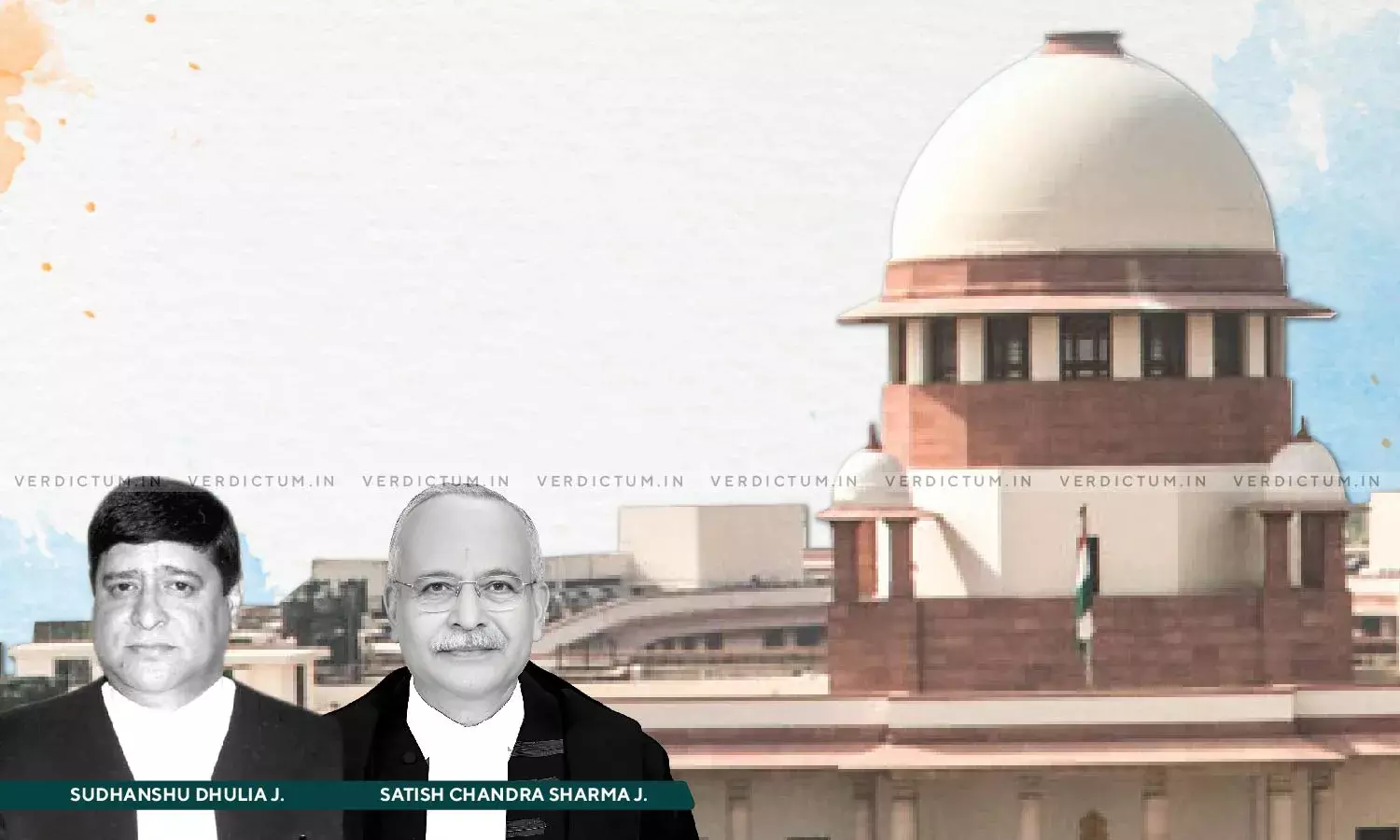Offence U/S 364A Is Not Attracted If Abduction Or Kidnapping Is Without Demand Of Ransom: Supreme Court

The Supreme Court held that an offence under Section 364A of the Indian Penal Code, 1860 (IPC) is not attracted if abduction or kidnapping is without any demand of ransom.
The Court disposed of an Appeal challenging the order of the High Court affirming the convection order of the Trial Court under Sections 307, 120B, 364-A, 392 and 397 of the IPC.
The Court noted that the prosecution was unable to prove the existence of a ransom call and therefore the accused could not be held liable under Section 364A IPC.
The Bench comprising Justice Sudhanshu Dhulia and Justice Satish Chandra Sharma observed, “section 364A is an offence where kidnapping or abduction is made and a person is put to death or hurt; or a person is threatened with death or actually murdered, on demand of ransom”.
Advocate Sameer Shrivastava appeared for the Appellant and Advocate Sumeer Sodhi appeared for the State.
Two Appeals were filed before the Supreme Court challenging the judgment and order of the High Court that upheld the conviction order of the Trial Court. The Appellants were convicted for offences under Sections 307, 120B, 364-A, 392 and 397 and were sentenced to life imprisonment under Section 364A of the Indian Penal Code, 1860 (IPC). However, the Third Accused was acquitted by the Trial Court.
The Prosecution alleged that the Appellants abducted a Class 12th student for ransom, attempting to kill him during the incident. Despite sustaining grievous injuries, the victim escaped, leading to the amputation of his right leg. The victim, residing as a paying guest, was picked up by the Accused for a motorcycle ride but was later attacked, with attempts to strangle him. Believing him to be dead, the Accused poured petrol on him and set him on fire, looting his mobile phone and cash. The victim, however, survived, escaped, and sought medical attention, prompting police involvement.
The Court noted the prosecution's successful establishment of attempted murder and robbery charges beyond a reasonable doubt. However, doubts surfaced regarding the conviction under Section 364-A of the IPC, particularly concerning Neeraj Sharma, prompting the issuance of a limited notice of its applicability.
The Bench noted, “the importance of injured witness in a criminal trial cannot be over stated. Unless there are compelling circumstances or evidence placed by the defence to doubt such a witness, this has to be accepted as an extremely valuable evidence in a criminal Trial”. The injuries sustained by the victim, including burn injuries on the legs and a ligature mark on the neck, aligned with the prosecution's narrative of attempted strangulation using a clutch wire.
The Bench noted that while abduction alone might not be a specific IPC offence, its combination with other acts, such as intent to commit murder, falls under Section 364 IPC. Abduction becomes an offence under various circumstances, including wrongful confinement (Section 365, IPC) or compelling a woman for marriage (Section 366, IPC).
Additionally, the Court noted that Section 364A criminalizes kidnapping or abduction resulting in a person's death or injury, or when a person is threatened or murdered for ransom. “Section 364A IPC was inserted in the Indian Penal Code by an Act of Parliament (Act No.42 of 1993 with effect from 22nd May, 1993). That was a period when kidnapping and abduction for the purposes of ransom were on the rise and therefore, the Law Commission of India in its 42nd Report in 1971 had recommended insertion of Section 364A in IPC”, the Bench added.
In this case, evidence pointed to a Section 364-A offence based on a phone call to the victim's father by Ravi Kumar Dwivedi, the acquitted third accused. However, the prosecution failed to provide supporting evidence under Section 165 of the Evidence Act, 1872 (IEA). The victim's supplementary statement had limited relevance, as it was not mentioned in the initial examination.
The Court referred to the case of Shaik Ahmed v. State of Telangana [(2021) 9 SCC 59], noting that “to make out an offence under Section 364 A, three conditions must be met: A) There should be a kidnapping or abduction of a person or a person is to be kept in detention after such kidnapping or abduction; B) There is a threat to cause death or hurt to such a person or the accused by their conduct give rise to a reasonable apprehension that such person may be put to death or hurt C) Or cause death or hurt to such a person in order to compel the Government or any foreign state or intergovernmental organisation or any other person to do or abstain from doing any act or to pay a ransom”.
Furthermore, the Court observed that the victim did not mention any ransom demand in his examination. Although he mentioned it in a supplementary police statement, the only deposition in Court came from the victim's father, lacking substantial evidence, as the third accused allegedly making the demand had been acquitted.
The Court highlighted the Trial Court and the High Court's oversight of a critical flaw in the Section 364A evidence, relying on statements of prosecution witnesses. The High Court's categorization of the supplementary statement as a "dying declaration" was inaccurate, given its nature as a statement under Section 162 of the Criminal Procedure Code, 1973 (CrPC).
The Bench partially allowed the appeals, overturning the Section 364A conviction to Section 364 IPC, with a ten-year rigorous imprisonment and a fine of Rs.10,000/- for the accused.
Remaining convictions under Sections 307, 120B, 392, and 397 IPC were upheld, along with the fine of Rs.50,000/-, and a compensation of Rs.5,00,000/- directed to be paid to the victim under Section 357A of CrPC.
Accordingly, the Court disposed of the Appeal.
Cause Title: Neeraj Sharma v State Of Chhattisgarh (2024 INSC 6)

